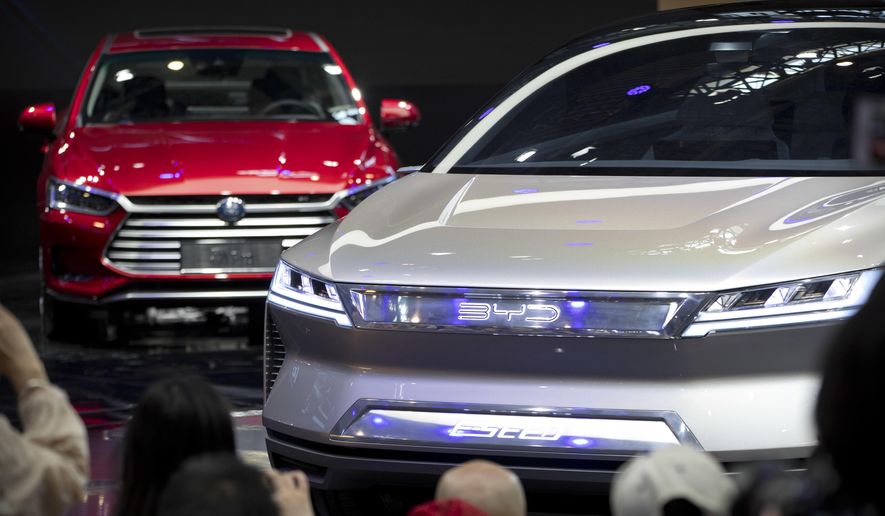House Democrats passed a massive surface transportation bill on Thursday meant to hasten America’s transition away from gas-powered cars over objections from Republicans, who argued the legislation only benefits China.
In a 221-to-201 vote, the House passed the INVEST Act, which aims to spend $715 billion on upgrading the nation’s transportation and water infrastructure.
The bill, which faces long odds in the evenly split Senate, would spend $4 billion over the next five years to deploy electric vehicle charging stations across the country. It also includes $4 billion for state and local governments to transition their fleets of gas-powered buses to electric ones.
GOP lawmakers argued the legislation would spend billions of dollars, much of it to China’s benefit.
“The [Democratic] majority is selling out to China … specifically when it comes to promoting widespread adoption of electric vehicles and deployment of charging infrastructure,” Rep. Sam Graves of Missouri, the ranking Republican on the House Transportation Committee, told The Washington Times.
That reality stems from the communist regime’s dominance of the electric-vehicle battery market.
In 2019, China produced 72% of the world’s lithium-ion rechargeable batteries, while the U.S. accounted for 9%. Such batteries are used to power the engines in electric vehicles, the Energy Department says.
The communist regime’s advantage is partially the result of long-range investment and planning. Beijing is on track to develop at least 107 lithium-ion battery mega factories through 2030, compared to only nine in the U.S.
More troubling is that Beijing also controls access to the rare earth minerals needed to produce electric-vehicle batteries.
A report by the London-based firm Benchmark Mineral Intelligence said China produces 80% of the total raw materials used for advanced batteries, including such minerals as lithium, cobalt, nickel and graphite.
Last year, the U.S. imported about 80% of its rare earth minerals and compounds from China.
Complicating matters is that China’s dominance stems from trade partnerships with countries accused of using both slave and child labor. The Democratic Republic of the Congo, in particular, allegedly uses forced child labor to mine raw cobalt, which is then exported to China for processing.
Given Beijing’s control of the electric-vehicle supply chain and its ties to human-rights abuses, Republicans sought to change the INVEST Act to ensure federal tax dollars don’t go to underwrite the communist power.
“The unfortunate truth is that many of the technologies which Americans enjoy today are made with minerals sourced by child slaves in countries like the Congo,” said Rep. Pete Stauber, Minnesota Republican. “This is unacceptable.”
During a Transportation Committee hearing on the bill last month, Mr. Stauber and other Republicans offered various amendments to crack down on China.
One such amendment would have imposed strict “Buy American” requirements on the critical minerals used by electric vehicle manufacturers who received federal subsidies.
“Rather than continue to rely on nations that exploit child labor, we must hold our nation to a much higher standard and empower American workers to responsibly source these critical minerals here under the best environmental and labor standards in the world,” said Mr. Stauber. “Ending child labor should not be a partisan effort and it remains a mystery to me as to why my Democrat colleagues continue to turn a blind eye to these abuses.”
The amendment, however, was voted down by Democrats. Some pointed to existing “Buy American” provisions, which do not begin until mid-2024, and what they call a pressing need to combat climate change as justification for their opposition.
“China may be a communist country, but they are leading the world right now in transportation technology,” Rep. Seth Moulton, Massachusetts Democrat, said at the time. “They have recognized that they get a better return on investment for high-speed rail. And I say, why should Chinese travelers have more freedom, more options to travel than Americans?”
Other Democrats, though, suggested GOP lawmakers were being xenophobic for signaling China out.
“We just passed a bipartisan bill about anti-Asian hate crimes,” said Rep. Marilyn Strickland, Washington Democrat. “As I have listened to these conversations, I do not hear my colleagues making distinctions between works of the Chinese government and Chinese people.”
Mr. Graves, who voted against the bill on Thursday along with most Republicans, said such attacks only distract from the real issue at hand.
“China is known to rely on slave and child labor to mine many of the critical minerals that are key components in the charging infrastructure funded in this bill,” Mr. Graves said. “Congress should not be sending U.S. tax dollars to line the pockets of the Chinese government and their allies.”
• Haris Alic can be reached at halic@washingtontimes.com.




Please read our comment policy before commenting.